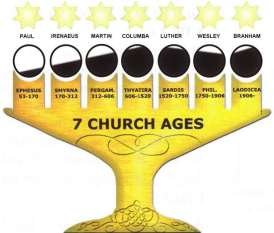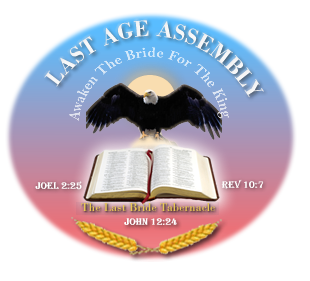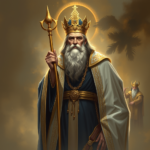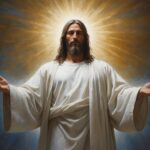
This is just the summaries of the church messengers, their works, and the key patterns God reveals to William Marrion Branham to identified the messengers through the ages.
The keys are:
1) Hebrews 13:8 Jesus Christ the same yesterday, and today, and forever.
2) Ecclesiastes 3:14 I know that whatsoever God doeth, it shall be for ever: nothing can be put to it, nor anything was taken from it: and God doeth it, that men should fear before him.
Revelation 2:1-7 is the Message to the First Church Age: Ephesus
Paul was the prophet messenger to the Gentiles. His prophetic office by which he received the full revelation of the word for the Gentiles authenticated him as their apostolic messenger.
To this agreed to the other apostles at Jerusalem Gal 1:12-19 for I neither received it of man, neither was I taught it, but by the revelation of Jesus Christ.
His manner of ministering set the pattern that all future messengers were to aspire to, and actually sets the pattern for every true minister of God.
He was true to the word, never deviated from it no matter the cost Galatians 1:8-9.
Miracles by Paul
Acts 14:8-9 Paul heal a man, who was cripple from his mother’s womb.
Acts 20:9-12 A widow name Eutychus being fallen into a deep sleep and as Paul was long preaching he sunk down with sleep and fell down from the third loft, and was taken dead.
Paul went down and fell on him, and embracing him said, Trouble not yourselves, for his life is in him.
When he, therefore, was come up again, and had broken bread and eaten, and talked a long while, even till the break of day, so he departed.
Acts 28:7-9 Paul heal the father of Publius of the bloody flux, and others in that island who had such diseases.
2 corinthians 12:12 Truly the signs of an apostle were wrought among you in all patience, in signs, and wonders, and mighty deeds.
Revelation 2:8-11 The Message to the Second Church Age: Smyrna
Irenaeus was exalted by the Lord to that position. He was the disciple of that great saint and warrior of faith, Polycarp. Polycarp was martyred, too old to flee, and too sincere a man to allow another to hide him and then suffer a penalty for doing so, he gave himself up to death. But before he did, he asked for and was granted permission to pray for two hours for his brethren in the Lord, for the governor, for his enemies and his captors. Like the great saints of all ages, and desiring a better resurrection, he stood firm, refusing to deny the Lord and died with a free conscience. He was placed at the stake (Untied at his own request ) and the fire was lit. The fire bent away from his body, refusing to touch him. He was then pierced through with a sword. As this was done, water gushed from his side drowning the flames. His spirit was actually seen to depart in the form of a white dove released from his bosom.
Irenaeus was militant against any form of organization. Wherein he served the Lord was one of many manifestations in the Holy Spirit, and the word was taught with unusual clarity and conformity to its original precepts.
His churches in France were known to have the gifts of the spirit, spoke in tongues, prophesied, raised the dead, and healed the sick by the prayer of faith.
He saw the danger of any kind of organization brotherhood among the elders, pastors, etc. He stood solidly for a unified, spirit-filled, gift-manifesting local church. And God honored him for the power of God manifested among the saints.
He was also clear on his understanding of the Godhead. And since he was the disciple of Polycarp, who in turn was the disciple of Saint John.
We have his statement in the Ante Nicene vol 1 page 412. All the other expressions likewise bring out the title of one, and the same being, the Lord of power, the Lord, the Father of All, GOD ALMIGHTY, MOST HIGH, CREATOR, MAKER, these are not the names and the title of a succession of different being, but of one and same. He pointed out clearly that these are but titles as in Rose of Sharon, Bright and morning star, Fairest of Ten thousand, etc. Neither is there but ONE GOD. His name is LORD JESUS CHRIST.
Revelation 2:12-17 The Message to the Third Church Age: Pergamean
Martin was born in 315 in Hungary. He works in France, where he labored in and around. Tour as a bishop. He died in 399. This great saint was the uncle of another wonderful Christian st. Patrick of Ireland.
Martin was converted to Christ while he was following a career as a professional soldier.
It is recorded that a beggar lay sick in the streets of the town where Martin was posted. The winter cold was more than he could bear for, he was poorly clad ( clothed ) No one paid any attention to his needs until Martin came by, seeing this poor man’s plight, but not having an extra garment, he took off his outer cloak, cut it in two with his sword, and wrapped the cloth around the freezing man. He attended him the best he could and went on his way. That night the Lord Jesus appeared unto him in a vision. There He stood like a beggar, wrapped in half of Martin’s garment. He spoke to him and said. “Martin thought he is only a catechumen has clothed me with this garment. ” Catechumen means one receiving instruction from a catechist.
From that time on Martin sought to serve the Lord with all his heart. His life became a series of miracles manifesting the power of God.
After having left the army and having become a leader in the church, he took a very militant stand against idolatry. He cut down the groves, broke up the images, and pulled down the altars. When confronted by pagans for his deeds, He challenged them in much the same manner that Elijah did the prophets of Baal.
He offered to be tied to a tree on its underside so that when it was cut down it would crush him unless God intervened and turned the tree around while it fell.
The Wiley heathen tied him to a tree that was growing on the side of a hill, assured that the natural pull of gravity would cause the tree to so fall as to crush him ( Martin ). Just as the tree began to fall, God swung it around and uphill, contrary to all natural laws. The fleeing heathen were crushed as the tree fell on several of them.
Historians acknowledge that on at least three occasions he raised the dead by faith in Jesus’ Name.
In one instance he prayed for a dead baby, like Elisha, he stretched himself upon the baby and prayed, the baby came back to life and health.
On another occasion, he was called to help deliver a brother who was being carried away to his death in a time of persecution. By the time he arrived the poor man was already dead. They had hanged him upon a tree, his body was lifeless and his eyes protruded from the sockets. But Martin took him down and when he had prayed the man was restored to life and to his rejoicing family.
Martin never did fear the enemy regardless of who it was. He went personally to face a wicked emperor who was responsible for the death of many spirit-filled saints. The emperor would not grant an audience, so Martin went to see a friend of the emperor, one Damasus, a cruel bishop of Rome. But the bishop, being a nominal Christian of the false vine would not intercede.
Martin went back to the palace, but by now the gates had been locked, and they would not allow him to enter. He lay down on his face before the Lord and prayed that he be able to get into the palace. He heard a voice bidding him arise. When he did so, he saw the gates open of their own accord. He walked into the court. But the arrogant ruler would not turn his head and speak to him. Martin again prayed suddenly a fire came spontaneously from the seat of the throne and the unhappy emperor vacated speedily. Surely the Lord humbles the proud and exalts the lowly.
The enemies of truth hired assassins to kill martin, they came to his home, and as they were about to kill him, he stood erect and bared his throat to the sword. As they leaped forward the power of God suddenly hurled them back across the room. They crawled upon their hands and knees and begged forgiveness for the attempt upon his life.
One the night he was preparing himself to enter the pulpit, a beggar came to his study and asked for some clothing. Martin referred the beggar to his head deacon. The haughty deacon commanded him to leave. Thereupon he went back to see Martin. Martin arose and gave the beggar his own fine robe, and bade the deacon bring him another robe which was of lesser quality. That night as Martin preached the word, the flock of God saw a soft white glow of light around his person.
He pleases God, he lived a most consecrated life, he never preaches until he hears from God.
He fought organization, he withstood sin in high places.
A biographer wrote of him on this wise “No one ever saw him angry”.
Revelation 2:18-29 The Message to the Fourth Church Age: Thyatira
However there two men in the British isles, whose ministry in word and deed could stand the test of truth. They were saint Patrick and saint Columba. It was Saint Columba that a lot of being the messenger fell.
William Branham started by dwelling a little on life of Saint Patrick as an example to us and also to give the lie to Rome’s claim that Saint Patrick was more one of her than was Joan of Arc. Patrick was born to sister of saint martin in the little town of Bonavern on the banks of River Clyde. One day while playing on the shoreline with his two sisters, pirates approached and kidnapped all three, where the sisters went no one knows, but Patrick ( his name was succat) was sold to a chieftain in northern Ireland. His duty was to tend to the swine. To do this he trained dogs, so well trained were his dogs that people came from far and near to buy them.
In his loneliness, he turned to God and was saved. Then came the urgent desire to escape and return home to his parents. He formed a plan that put his ability as a trainer to great use. He taught the dogs to lie on him and cover his body carefully and not move until commanded. Thus one day when his owner sold several dogs, Patrick commanded the dogs except for the leader of the pack to get into the boat. The leader of the pack to which he then gave a secret signal ran off and refused to come aboard. While the master and the buyer attempted to get the dogs, Patrick got into the boat and signaled the dogs to cover him. Then with a whistle, he brought the leader of the pack into the boat and on top of him.
Since Patrick was nowhere to be seen the buyer put sail and moved out to sea.
After making sure that the captain was too far out to turn back, Patrick gave another signal to the dogs, which caused them to riot. Then he came forth and told the captain that unless he would put him ashore at his home, he would command the dogs to keep rioting and he would take over the ship. However the captain was a Christian, and when he heard the boy’s story he gladly put him ashore at his home. There Patrick went to bible school and return to Ireland whereby the word and power of God in many signs and wonders, he won thousands to the Lord.
At no time did he ever go to Rome, nor at any time was he commissioned by Rome.
The truth of the matter is that when Rome finally gained a foothold on the island and when they saw the time was opportune, they killed over 100,000 Christians who had over the years grown out of the original group that had come to the Lord under Saint Patrick.
About 60 years after the death of Saint Patrick, Columba was born in country Donegal, North Ireland, to the royal family of Fergus. He became a brilliant consecrated scholar committing to memory most of the scripture. God called him in an audible voice to be a missionary. After he had heard the voice of God, nothing could stop him, and his miraculous ministry has caused many historians to acclaim him next to the apostles. So great was his ministry with supernatural signs following, that some ( especially students in Rome) have thought the account was exaggerated.
In one of his missionary journeys, as he approached a walled city, he found the gates barred against him, He lifted his voice in prayer that God might intervene and allow him access to the people in order to preach. But as he prayed the court magicians began to harass him with loud noises. He then began to sing a psalm. As he sang God so increased the volume of his voice that he drowned out the cries of the heathen. Suddenly the gates burst open of their own accord. He entered in and preached the gospel, winning many to the Lord.
On another occasion when he was also shut out from a village, as he turned away to depart, the son of the chief suddenly became violently ill, even unto death. Saint Columba was quickly sought after and recalled. When he prayed the prayer of faith, the boy was instantly healed. The village was opened to evangelization by the gospel.
The pure Gospel that was preached by Columba and his fellow workers spread over the whole of Scotland, turning it to God. It also overflowed into Ireland and over Northern Europe.
His means of spreading the Gospel was one wherein perhaps twelve men under a leader would go into a new area and literally build a Gospel-centered; amongst these twelve men would be carpenters, teachers, preachers, etc.
This little colony was enclosed by a wall, soon this enclosure would be surrounded by students and their families in their own homes learning the word and preparing to go out and serve the Lord as missionaries, leaders, and preachers.
The men were free to marry though many did not, in order to serve God the better.
They taught the truth, for they believed that the truth was weapon enough to accomplish the ends that God had in mind for them. They were absolutely independent of Rome.
Saint Columba was the founder of a great bible school on the Island of HY ( off the s.w coast of Scotland) when he went there, the island was so barren and rocky that it could not bear enough food for them all. Nevertheless, Columba planted the seed with one hand while he held the other aloft in prayer. Today the island is one of the most fertile in the world. Form this Bible-centered island went forth mighty scholars endowed with wisdom and the power of God.
Revelation 3:1-6 The Message to the Fifth Church Age: Sardis
Luther was a brilliant scholar of gentle disposition.
He was studying to be a lawyer when the lingering illness and death of a near friend caused him to become serious concerning the spiritual condition of his life. He entered the Augustinian convent at Erfurt in 1505. There he studies philosophy and also the word of God. He lived the life of severest penance but no outward acts could banish his sense of sin. He said I tormented myself to death to make right with God, but I was in darkness and found it not. The vicar-general of his order, Staupitz helped him to gain the insight that his salvation would have to be the experience of an inner work rather than a ritual.
With this encouragement, he further sought God. Later he became a priest, yet he was not saved.
He became an avid and deep student of the word and of the great theological works extant.
He was sought out as a teacher and preacher for his depth of knowledge and great sincerity.
To fulfill a vow he had made to himself he went to Rome. There he saw the futility of the church’s imposed works that were to bring salvation, and the word of God struck home to his heart.
“The just shall live by faith” on his return home, the evangelical truth of this scripture flooded his mind, and he was set free from sin and born into the kingdom of God.
Soon after this he was elevated to Doctor of Divinity and commissioned to devote his whole life to study and faithfully expound and defend the holy scripture. This he did, soon the word of truth came into open conflict with the abuses of church creeds and doctrine.
This when Leo X become pope, and John Tetzel came to sell indulgences for sin, Luther had no choice but to rise up against this anti-scriptural teaching. First, he thundered from the pulpit against it and then wrote his famous 95 theses which on October 31, 1517, he nailed to the door of the castle church.
Soon after Germany was ablaze and the reformation was on. Now let it be remembered that Martin Luther was not the only one who had protested the Roman Catholic church. He was but one of many others had denied the popes their self granted temporal and spiritual power, and even amongst the popes, there were minor temporary reforms.
But in the case of Luther, God’s time was ripe for a definite move that would be the beginning of the restoration of the church to an outpouring of the Holy Ghost at a much later date.
Martin Luther himself was a sensitive spirit-filled Christian. He loves the word and had a profound passion to study it, and make it available to all in order that all might live by it.
He translated the New Testament and gave it to the people. This laborious work he did himself correcting a passage as much as twenty times. He gathered around him a group of Hebrew scholars amongst whom were Jews and translated the old testament.
He was a mighty preacher and teacher of the word and insisted especially in his first years of public eminence that the word was the sole criterion. Thus he was against works as a means of salvation and baptism a means of regeneration.
He gave more of his time to God in prayer in order to ensure satisfactory results. He knew what it was to battle with the devil and it is said that satan one day visibly appeared to him, and he flung the link well at him bidding him go. Another time two fanatics came to him to induce him to join with them in banishing all priests and Bibles. He discerned the spirit within them and sent them off.
It is recorded of Dr. Martin Luther in Sauer’s History Vol 3, page 406 that he was a prophet, evangelist, speaker in tongues, interpreter, in one person endowed with all nine gifts of the spirit.
The church as it was known at Pentecost was coming back, the doctrine of justification: Salvation by grace, apart from works.
William Branham recognizes that Dr. Luther did not believe only, and preach only justification, but that was his major theme as indeed it had to be for that is the basic doctrine of the truth of the word.
He is forever the instrument in the hand of God who revived this truth.
He was the fifth-star messenger, and his message was “The Just Shall Live By Faith”.
His understanding of sovereignty, election, predestination, and other truths shows him to be a great man in the world.
Branham explains that Martin Luther was a reformer, not a prophet. Even though history book calls him a prophet, that doesn’t mean that the history book is right, for there is no record of Martin Luther qualifying as a true prophet of God. He was a fine grand scriptural sense of that word. He was a fine teacher with some of the manifestation of the spirit in his life, we praise God for that. He was not able to lead the church back to the whole truth as would a man like an apostle Paul who was both apostle and prophet.
Now as time went on we find a great change in the way he conducted the affairs in which he was involved. At first, he had been so gentle, so fearless, so patient and constantly waiting on God to work out the problem.
But then vast numbers began to come to his banner, their purpose was not a truly spiritual one. Rather they had political motivations. They wanted to break the York of the pope. They disliked sending money to Rome. Fanatics rose up, soon he was dragged into political affairs and decisions that actually lay outside the realm of the church, except that the church through prayer, preaching and conduct might set up a standard to be heeded. These problems of politics mounted until he was forced into an untenable position.
Revelation 3:7-13 The message to the Sixth Church Age: Philadelphia
John Wesly was born at Epworth, June 17, 1703, and was one of nineteen children born to Samuel and Susanna.
John was a brilliant scholar, it was while he was at Oxford that he and Charles became part of a group who were spiritually exercised to worship on the basics of experientially living the truth rather than making doctrine their standard.
They drew up a spiritual guide of works, such as giving to the poor, visiting the sick, and the imprisoned for they were called Methodists and other derisive titles.
He went to America (Georgia) as a missionary amongst the Indians. Back in London he again met the Moravians, he saw on a ship to America. It was Peter Boehler who showed him the way of salvation. He was truly born again.
Wesley now began to preach the gospel in those pulpits in London to which he formerly had access, but soon they turned him out. It was at this time that his old friend, George Whitefield, stood him in good stead, for he invited John to come and help him preach in the fields where thousands were listening to the word.
Wesley at first was incredulous that he should preach in the open instead of a building, but when he saw the throngs and saw the working of the Gospel in the power of the spirit, he turned wholeheartedly to such preaching.
The work soon took on such proportions that he began sending out numerous laymen to preach the word. This seemed like a parallel to Pentecost where the spirit raised up men with power to preach and teach the word almost overnight.
There was violent opposition to his work, but God was with him. The workings of the spirit were mightly manifested and often such a spirit of conviction took hold of the people as to take away their strength and they would fall to the ground crying in great distress over their sins.
Wesley was a remarkably strong man. He says of himself that he could not remember to have felt lowness of spirits for even a quarter-hour since he was born.
He slept no more than six hours a day, arose in time to start preaching at five practically every day of his ministry. He preached up to four times on a single day, so that in a year he would average over 800 sermons.
He traveled multiple thousands of miles as did his circuit riders who carried the Gospel near and far.
Wesley traveled 4500 miles per year by horse.
He was a believer in the power of God and he prayed for the sick with great faith and wonderful results.
Wesley was not in favor of the organization.
As time went on they worked out a strict set of rules to be used in self-discipline for the good of their souls. Wesley recognized that after his death the movement could organize and the spirit of God leaves them to dead form.
He once remarked that he did not fear that the name of Methodist would leave the earth, but that the spirit might take His flight.
During his lifetime, he could have acquired vast wealth, but he did not. His favorite saying on the subject of money was. ”Get all you can, save all you can, and give all you can”.
Wesley based his eternal life on faith and works, or the living of the life, rather than simply accepting a creed or a doctrinal statement.
Revelation 3:14-22 The Message to the Seventh Church Age: Laodicean
As we know the messenger to his age, as accepted by the end time message worldwide is that the star messenger to this Laodicean age is William Marrion Branham.
We will differ here, we want to rightly divide the Word of Truth, Brother Branham was called to do one primary thing, that is to point the people back to the Bible, that’s why the angel told him, saying and I quote, If you can get the people to believe, there is no sickness that can stand your way.
In fact, the song he loved most is called/title only believe. What then is William Branham?
William Marrion Branham is The John Baptist to the Gentile Nation, to lead us back to the WORD = JESUS.
In the time Jesus was on earth, we have the apostles and we have John the Baptist as well, but John the Baptist is not among the apostles, his work is to introduce or usher in the word/lamb, we have no right to force him into being one of the 12 apostles
Matthew 11:11 (KJV)
11 Verily I say unto you, Among them that are born of women there hath not risen a greater than John the Baptist: notwithstanding he that is least in the kingdom of heaven is greater than he.Luke 7:26-28 (KJV)
26 But what went ye out for to see? A prophet? Yea, I say unto you, and much more than a prophet.
27 This is he, of whom it is written, Behold, I send my messenger before thy face, which shall prepare thy way before thee.
28 For I say unto you, Among those that are born of women there is not a greater prophet than John the Baptist: but he that is least in the kingdom of God is greater than he.
Malachi 4:5 (KJV)
Behold, I will send you Elijah the prophet before the coming of the great and dreadful day of the LORD:
NOTE: Elijah anointing will come five times before Jesus returns, the five-letter name JESUS:
First: Elijah that was the first anointing.
Second: Elisha that succeed Elijah.
Third: John the Baptist
Fourth: William Branham
Fifth: The two prophets in revelation 11 to call out the Jew.
Take note, Brother Branham never called himself the last or 7th messenger, but this is what he had to say about the messenger. He said-:
He will have the office of a prophet.
He will have the prophetic ministry.
His ministry will be based solidly on the word because when he prophesies or has a vision, it will always be ” Word-Oriented ” and it will always come to pass.
These sayings of brother Branham the Holy Spirit is using him to describe who he was, he said the seventh messenger will a prophet office.
Luther is not a prophet, John Wesly is not a prophet, and William J Seymour is not a prophet. There are reformers, Pastors, Servants God used to restore the Word that the Dark Ages has buried. Joel 2:25 (KJV)
25 And I will restore to you the years that the locust hath eaten, the cankerworm, and the caterpillar, and the palmerworm, my great army which I sent among you.
Amos 3:6-8 (KJV)
6 Shall a trumpet be blown in the city, and the people not be afraid? shall there be evil in a city, and the LORD hath not done it?
7 Surely the Lord GOD will do nothing, but he revealeth his secret unto his servants the prophets.
8 The lion hath roared, who will not fear? the Lord GOD hath spoken, who can but prophesy?
Deuteronomy 18:22 When a prophet speaketh in the name of the LORD, if the thing follows not, nor come to pass, that is the thing which the LORD hath not spoken, but the prophet hath spoken it presumptuously: thou shalt not be afraid of him.
Vindication of William Branham Ministry.
Mystery cloud
Pillar of fire ( Halo of fire over his head )
A voice spoke from heaven
At Ohio river during baptism, a voice spoke that as john’s message forerun His first coming so
his message will forerun His ( Jesus ) second coming.
Prophetic gift of discernment
Gift of healing
Exposition of the Seals, Serpent Seed, God Head, Seventy Weeks of Daniel.
WHO THEN IS THE SEVENTH CHURCH MESSENGER?
The Message to the Seventh Church Age: Laodicean IS William J. SEYMOUR ( May 2, 1870 )
William Joseph Seymour (May 2, 1870 – September 28, 1922) was an African American, holiness preacher who initiated the Azusa Street Revival, an influential event in the rise of the Pentecostal and Charismatic movements. He was the second of eight children born to emancipated slaves and was raised in extreme poverty in Louisiana.
From his ministry started the Azusa Street Revival, which triggers the Pentecostal movement that restores the third works of Grace.
Justification By Luther
Sanctification By Wesly
Baptism oF The Holy Ghost By W.J Seymour.
William Branham is The John the Baptist of our Time/ or to the Gentile Nation, he gave us a full meal.
Matthew 13:33 (KJV)
33 Another parable spake he unto them; The kingdom of heaven is like unto leaven, which a woman took, and hid in three measures of meal, till the whole was leavened.
Revelation 6:5-6 (KJV)
5 And when he had opened the third seal, I heard the third beast say, Come and see. And I beheld, and lo a black horse, and he that sat on him had a pair of balances in his hand.
6 And I heard a voice in the midst of the four beasts say, A measure of wheat for a penny, and three measures of barley for a penny; and see thou hurt not the oil and the wine.
The revival started on April 9, 1906, he died on September 28, 1922, while William Branham was born on April 6, 1909.
Just a little game here, just watch they date of birth
The revival started April 9, 1906, William Branham was born on April 6, 1909, when you turn the nine of the April and six of the year the revival started, you get the birth date of Brother Branham.
Shalom.






